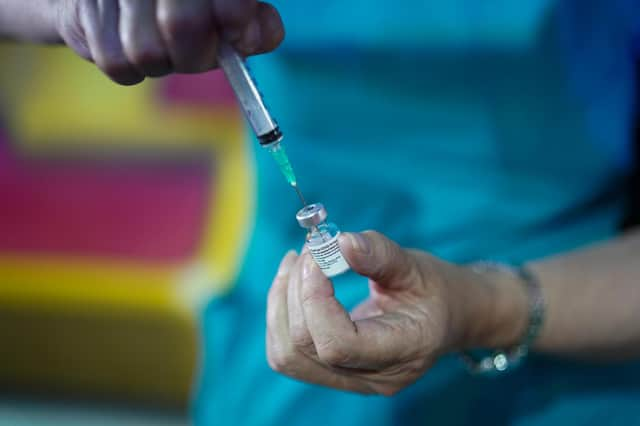How Sheffield research has created better Covid-19 tests - and will reduce train delays


It may not be ‘very Yorkshire’ to shout about our achievements, but I am exceptionally proud of the impact Sheffield-made research in medicine and health, science, arts and humanities, social science and engineering has had over the past 12 months.
Although the pandemic is far from over, last January we were still in lockdown and only at the very early stages of the vaccine rollout, so we have come a long way from where we were at the beginning of the year.
Advertisement
Hide AdAdvertisement
Hide AdDuring 2021, University of Sheffield research into the Covid-19 virus and its effects continued to inform the national response to the pandemic.
Dr Thushan de Silva from the University of Sheffield’s Medical School was awarded an MBE in recognition of his team’s contribution to the global effort to track virus mutations and characterise immunity to SARS-CoV-2. This ground-breaking work has paved the way for scientists to learn and share vital information about the Omicron variant.
Over the past year, testing for Covid-19 has become part of our everyday lives in order to keep those around us safe.
Working with a Yorkshire-based company, Paraytec, scientists from our School of Biosciences have developed a more accurate, efficient and low cost Covid-19 test. Though not yet commercially available, early results suggest that the test detects intact viral particles in a way that is quicker than a PCR and more accurate than a Lateral Flow Test.
Advertisement
Hide AdAdvertisement
Hide AdIn examining the wider impact of Covid-19, researchers from our Institute for Sustainable Food mapped the extent of food insecurity in the UK and are also evaluating responses to food insecurity during the pandemic.
Their pioneering studies showed that in one out of every six local authorities, rates of hunger are more than 150 per cent the national average. The Sheffield studies have stirred much debate and brought to the fore wider issues of inequality, the high cost of living and in-work poverty.
A new report conducted by Sheffield researchers also revealed the catastrophic impact of Covid-19 on the UK’s arts, culture and heritage sector.
At the same time our economists helped to inform local authorities about household and business recovery risk at a neighbourhood level, helping people to assess how quickly they will recover financially from Covid-19 when restrictions were lifted earlier this year.
Advertisement
Hide AdAdvertisement
Hide AdThe findings from these ground-breaking studies will be integral to how we learn to adapt and overcome challenges presented by the pandemic.
Whilst we continue to live with the challenges presented by the pandemic, our outstanding research also focuses on significant global challenges.
Our scientists and students are playing a critical role in pioneering real-world solutions needed to tackle climate change and attended COP26 to share their innovative research with world leaders and environmental experts.
Our engineers are helping to propel the UK to ‘jet zero’ emissions through technologies for lighter aeroplanes with new propulsion systems and sustainable aviation fuels.
Advertisement
Hide AdAdvertisement
Hide AdThe University of Sheffield has a long history delivering translational research which makes a real difference to people’s lives. In 1930, penicillin was used as a therapy for the very first time here in Sheffield.
Dr Cecil George Paine, a former student of Alexander Fleming and a member of the University’s Pathology Department, used it to treat an eye infection in two babies.
Although penicillin and other antibiotics in its class have been a centrepiece of human healthcare for over 80 years and have saved over 200 million lives, until now, how they kill bacteria has remained a mystery.
However, this year Sheffield scientists uncovered the mechanism of how antibiotics like penicillin work.
Advertisement
Hide AdAdvertisement
Hide AdThis milestone discovery gives scientists new avenues for further treatment development to fight the urgent global challenge of antimicrobial resistance.
Although many of us have become more acquainted with working from home since the start of the pandemic, for commuters a revolutionary technology developed by engineers at the University of Sheffield, could see delays to train services caused by leaves on the line become a thing of the past.
The new track cleaning technology can be deployed on passenger trains - the first time passenger trains have been used to clean a railway anywhere in the world. This could resolve a problem that costs the railway industry millions of pounds each year.
Our research underpins an impressive portfolio of innovation that helps organisations to translate our research into new products and processes that make tangible differences to our regional and national society and economy.
Advertisement
Hide AdAdvertisement
Hide AdThis year our Advanced Manufacturing Research Centre (AMRC) and Nuclear AMRC have gone from strength to strength and continue to attract companies to invest in South Yorkshire and beyond.
We also announced a pioneering gene therapy innovation centre that is set to advance scientific discoveries into promising treatment options for millions of patients with life-threatening diseases.
As we look to 2022, we are looking forward to working with even more people and organisations across South Yorkshire to deliver research, innovation and skills that make a difference to people’s lives and livelihoods.